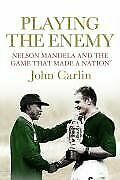Take a photo of a barcode or cover
Incredible story, masterfully told. The power of leaders, of forgiveness and of sport.
'Playing the Enemy' is one of those non-fiction pieces that you scarcely would have allowed yourself to believe to be true, lest you know it was. It is also one of these texts that you pick up, completely prepared for on subject, and soon you are delivered something that you did not expect.
The novel follows the famous south African Nelson Mandela, president, human rights activist and, as accordance to the subject matter of the book, a dedicated rugby fan. The first half, if not more, of the book takes the reader on a tour of his life as well as the lives of millions of South African residents as they lived during the time before, during, and have human rights reform in the once turmoil African nation. It tells of the imprisonment of Nelson Mandela, his distinct social power and abilities, and how they eventually led to his release from prison.
There is also significant mention and accounts of the social and physical abuse suffered by the blacks under the powerful white government, and how Mr. Mandela was able to persuade them to not retaliate with anger, but with such emotions as love and forgiveness.
During this telling, the book is punctuated with 'where-is-he-now' points concerning the life of Francois Pinaar, who would become the captain of the South American rugby team during the 1995 Rugby World Cup, of which the book speaks.
Finally, the book turns to the concern of rugby. (I have my single grievance with this book because it was supposed to be about 'Nelson Mandela and the Game That Changed a Nation, but over half of the book seemed a pre-requisite to this idea. Although it was not as if the first section of the book was not informative. On the contrary, it was quite intriguing!)
Watching the nation of South Africa change was awe-inspiring. From a government headed entirely by whites to a country governed by President Mandela, a black former-prisoner, was a true testament to human forgiveness. The way he dealt with the people around him, of all races and of all intentions, may have been the deciding factor in the fate of his country. As was his attention to rugby, at first shunned by the black population for its connection to the white rule, it was now something that he could use to pull together his people with. All of his people.
The South African rugby team prevailed in the world cup, thanks to the support of Mr. Mandela, and 43 million South Africans. The rest, as they say, is history.
This is a fantastic novel for all those who want to not only read more on the history of South Africa, the amazing and inspiring life of Mr. Nelson Mandela, but also for those who want a read a book with surprising real events and an ending that will leave you feeling hopeful for the future.
The novel follows the famous south African Nelson Mandela, president, human rights activist and, as accordance to the subject matter of the book, a dedicated rugby fan. The first half, if not more, of the book takes the reader on a tour of his life as well as the lives of millions of South African residents as they lived during the time before, during, and have human rights reform in the once turmoil African nation. It tells of the imprisonment of Nelson Mandela, his distinct social power and abilities, and how they eventually led to his release from prison.
There is also significant mention and accounts of the social and physical abuse suffered by the blacks under the powerful white government, and how Mr. Mandela was able to persuade them to not retaliate with anger, but with such emotions as love and forgiveness.
During this telling, the book is punctuated with 'where-is-he-now' points concerning the life of Francois Pinaar, who would become the captain of the South American rugby team during the 1995 Rugby World Cup, of which the book speaks.
Finally, the book turns to the concern of rugby. (I have my single grievance with this book because it was supposed to be about 'Nelson Mandela and the Game That Changed a Nation, but over half of the book seemed a pre-requisite to this idea. Although it was not as if the first section of the book was not informative. On the contrary, it was quite intriguing!)
Watching the nation of South Africa change was awe-inspiring. From a government headed entirely by whites to a country governed by President Mandela, a black former-prisoner, was a true testament to human forgiveness. The way he dealt with the people around him, of all races and of all intentions, may have been the deciding factor in the fate of his country. As was his attention to rugby, at first shunned by the black population for its connection to the white rule, it was now something that he could use to pull together his people with. All of his people.
The South African rugby team prevailed in the world cup, thanks to the support of Mr. Mandela, and 43 million South Africans. The rest, as they say, is history.
This is a fantastic novel for all those who want to not only read more on the history of South Africa, the amazing and inspiring life of Mr. Nelson Mandela, but also for those who want a read a book with surprising real events and an ending that will leave you feeling hopeful for the future.
Read this along with my high school ESL students who had been in America for less than a year. At my school, this was the history department's idea of a good non-fiction historical book. (WTF?!) It was very hard for students to get through as this is all ancient history to them. To me, the beginning really dragged, slogging through most of South Africa's history between the native South African people and the Dutch East India "settlers". Once Nelson Mandela made an appearance it was enjoyable. My favorite parts were about the rugby players and matches. The ending of a united South Africa with their beautiful flag is something inspirational that America needs right now in the hate filled insular *Rump shitshow.
Because I am not a sports person, I was worried before I read this that it would contain "too much rugby" for me to understand and enjoy. Instead I was pleasantly surprised by how much history, politics, and diplomacy it details -- with great accessibility -- in the story of Nelson Mandela's attempts to unify a country that had been divided for so long. I'm sorry I didn't read this when it first came out, and I'm glad I've read it now. It has even made me interested enough in rugby to attend a match at the university where I work.
I have gotten super into rugby the last few years, and the Springboks have been my number one loved team (followed closely by the All Blacks) and after the 2nd World Cup win in a row I figured I needed to learn more about this team! I heard of the movie Invictus but had not watched it, and I am glad it didn't taint my views on this book. Carlin writes a detailed but not overwhelming account of Mandela's transition as the first Black South African president.
The book doesn't touch much on rugby in the first half, but instead gives the history, culture and attitude of the SA people around the movements out of Apartheid and around the game of Rugby in general.
I learned a ton I had not known before - like Mandela's own sports history, I never knew he was a boxer. And the book takes you viscerally into that first mixed race game with Mandela in the 6 jersey (now worn by Siya Kolisi as the first Black captain of the team).
I really enjoyed this.
The book doesn't touch much on rugby in the first half, but instead gives the history, culture and attitude of the SA people around the movements out of Apartheid and around the game of Rugby in general.
I learned a ton I had not known before - like Mandela's own sports history, I never knew he was a boxer. And the book takes you viscerally into that first mixed race game with Mandela in the 6 jersey (now worn by Siya Kolisi as the first Black captain of the team).
I really enjoyed this.
This book gave a good overview of the political situation at the end of the Apartheid. It didn't focus as much on the rugby game as the movie did, but I was ok with that.
I remember learning about South Africa and apartheid in High School, but like a lot of things I never really learned all of the details.
This book does a wonderful job of capturing the events and people that played a major role in the shaping of South Africa. (Though it was a little hard to keep all of the names straight...I attribute that to me just not being good with names). Starting in 1985 and ending in 1995 it is an interesting look at history that I've actually lived through and apparently knew little about.
Rugby and the World Cup finals game makes up a very small part of the book, but the build up starting with Mandela's militia roots to his imprisonment and the important lessons he learned there, to his release and historic presidential election, makes the game that much more important. We see the game and it's significance through the eyes of the people who helped the nation make such an important break through. (Enough to make the toughest rugby players cry).
We get to see Mandela's greatest strength--his power of persuasion and his uncanny ability to get people to like and agree with him--whether its to get a hotplate in prison or to stop a heavily armed coup.
Mostly, this book was a nice reminder that people can and do change.
This book does a wonderful job of capturing the events and people that played a major role in the shaping of South Africa. (Though it was a little hard to keep all of the names straight...I attribute that to me just not being good with names). Starting in 1985 and ending in 1995 it is an interesting look at history that I've actually lived through and apparently knew little about.
Rugby and the World Cup finals game makes up a very small part of the book, but the build up starting with Mandela's militia roots to his imprisonment and the important lessons he learned there, to his release and historic presidential election, makes the game that much more important. We see the game and it's significance through the eyes of the people who helped the nation make such an important break through. (Enough to make the toughest rugby players cry).
We get to see Mandela's greatest strength--his power of persuasion and his uncanny ability to get people to like and agree with him--whether its to get a hotplate in prison or to stop a heavily armed coup.
Mostly, this book was a nice reminder that people can and do change.
This book has interesting because I never knew how Nelson Mandela came out of prison and so quickly became the president of South Africa. Basically Playing the Enemy is a biography of Nelson Mandela and how he united South Africa with the help of rallying blacks and whites to support the national rugby team.
LOVE IT! Nuanced and insightful combination of politics, psychology, history, and inspiration.
To tak w ramach mojej aktualnej fascynacji rugby. Spodziewałam się książki bardziej o rugby właśnie, podczas gdy jest to książka o Mandeli. Nie czyni jej to zaraz złą, dowiedziałam się sporo i chciałabym dowiedzieć się więcej. Mniej może o samym Mandeli, ale więcej o RPA i jej historii.





